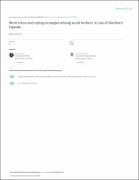| dc.contributor.author | Kabunga, Amir | |
| dc.contributor.author | Muya, Francis Kihoro | |
| dc.date.accessioned | 2019-11-28T10:04:31Z | |
| dc.date.available | 2019-11-28T10:04:31Z | |
| dc.date.issued | 2014 | |
| dc.identifier.citation | Amir, K., & Kihoro, M. F. (2020). Work Stress and Coping Strategies Among Social Workers: A Case of Northern Uganda. | en_US |
| dc.identifier.uri | https://hdl.handle.net/123456789/103 | |
| dc.description.abstract | Social workers are exposed to potent stressors due to the nature of their work. The study examined work
stress and coping strategies among social workers in Northern Uganda. The target population consisted of
353 social workers in Northern Uganda. Simple random sampling was employed to select 188 respondents.
Descriptive cross-sectional survey design was adopted. The Perceived Stress Scale (PSS) was used to assess
the level of stress while researcher developed questionnaires captured both the contributing and mitigating
factors. The findings established that majority of the respondents (91%) had high stress levels. Significant
factors contributing to stress included finances, work demand, safety concerns, family and violence from the
rebels. The most effective mitigating strategies for job stress included spirituality, planning, goal setting,
time-management and positive thinking. It was recommended that stress reduction programs and strategies
be implemented to mitigate work stress. | en_US |
| dc.language.iso | en | en_US |
| dc.publisher | International Journal of Liberal Arts and Social Science | en_US |
| dc.subject | Coping strategies | en_US |
| dc.subject | Northern Uganda | en_US |
| dc.subject | Social workers | en_US |
| dc.subject | Work stress | en_US |
| dc.title | Work stress and coping strategies among social workers: A case of Northern Uganda | en_US |
| dc.type | Article | en_US |

